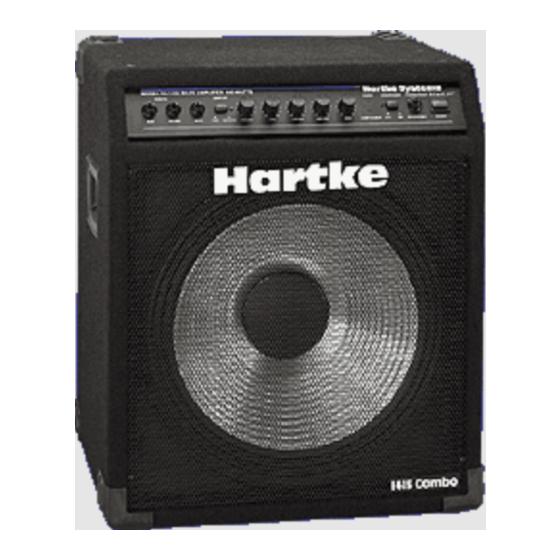Advertisement
Advertisement
Table of Contents

Summary of Contents for Hartke Transient Attack 1400
- Page 1 AMPLIFIER Hartke Systems Hartke Systems 1400/1415...
-
Page 2: Table Of Contents
Introduction 3 Features 4 Guided Tour 5 Front Panel 5 Rear Panel 7 Setting Up and Using the Hartke 1400/1415 Bass Amplifier 8 About Equalization 10 Effect of the Contour Switch 12 About Compression 13 Specifications 14... -
Page 3: Introduction
15” bass speaker, while the Model 1400 is an amplifier head alone which can be used with any 4, 8, or 16 ohm bass speaker cabinet. Both are optimized for use with electric bass instru- ments, and the actual amp circuitry in both models is identical. -
Page 4: Features
“perfect” practice amp. • A feedback-type input that accommodates a broad range of input levels (up to 15 volts), so that you can use the Model 1400/1415 with pretty much any kind of bass, from passive models to those with active circuitry. -
Page 5: Guided Tour
Model 1400/1415 from a professional outboard effects processor.* Hartke Systems MODEL 1400 BASS AMPLIFIER 140 WATTS Transient Attack EFFECTS CONTOUR POWER COMPRESSION 3. Input jack - Connect your bass guitar to the Model 1400/1415 here. This SEND RETURN INPUT FLAT ENHANCE VOLUME LOW MID... - Page 6 “0” position, the frequency area is attenuated. For more information, see the “About Equalization” section in this manual. 10. Power LED - Lights whenever the Model 1400/1415 is powered on. 11. Compression LED - Lights whenever compression is being applied to the incoming signal.
-
Page 7: Rear Panel
2. Speaker output - Connect any 4, 8, or 16 ohm bass cabinet to this standard unbalanced 1/4” jack. WARNING: Because of the high power levels and low frequency content of the signal generated by the Model 1400/1415, use only appropriately rated speaker cabinets that are specifically designed for... -
Page 8: Setting Up And Using The
2 - 3 feet of clearance. 2. In the Model 1400, begin by hooking up a speaker, using the 1/4” unbalanced Speaker output connector on the rear panel. It is never a good idea to power up any amplifier that is not connected to loudspeakers. - Page 9 6. Set the output of your bass to maximum and then, while playing, slowly turn the Model 1400/1415 Volume control up until the desired level is achieved. If you hear distortion even at low amplifier Volume settings, back off the output of your bass (or check for a faulty cable).
-
Page 10: About Equalization
The Model 1400/1415 provides you with four bands of equalization. Each EQ knob (labeled Low, Low Mid, High Mid, and High, respectively) affects a different fre- quency area (33 Hz, 80 Hz, 240 Hz, and 2.5 kHz, respectively) and provides... - Page 11 (you’d be amazed how easy it is to forget these things!). Finally, as you experiment with the EQ controls of the Model 1400/1415, don’t forget that your bass also provides EQ controls in the form of its tonal settings—...
-
Page 12: Effect Of The Contour Switch
Effect of the Contour Switch The Contour switch provides a unique control that allows the Model 1400/1415 to emulate the sound of a classic tube bass amplifier. When pressed in (the CONTOUR “Enhance” setting), a special kind of equalization curve is activated that provides moderate boost at 45 Hz, deep attenuation at 240 Hz, and gentle boost that peaks at approximately 3 kHz. -
Page 13: About Compression
Whether or not you need to use compression with your Model 1400/1415 will be a matter of personal taste and playing style—experiment and see if you like the effect. If you usu- ally play at low Volume levels, you’ll find that, even with the Compression switch in, the... -
Page 14: Specifications
Specifications 1. Rated Output Power (at 1 kHz, 4 ohm, THD 1%) 146 W 2. Total Harmonic Distortion (with 30 kHz LPF, 4 ohm, 140 W) 0.05% 3. Signal To Noise Ratio (with 30 kHz LPF) -68.6 dB 4. Frequency Response (at flat S/W on) 20 Hz -11.3 dB 40 Hz...










Need help?
Do you have a question about the Transient Attack 1400 and is the answer not in the manual?
Questions and answers